| Srl | Item |
| 1 |
ID:
113292
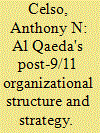

|
|
|
|
|
| Publication |
2012.
|
| Summary/Abstract |
The political transformations under way in the Arab world and the killing of Osama bin Laden raise serious questions about al Qaeda's long-term viability. The secular-liberal Arab Spring protest movement appears to be winning the war of ideas over al Qaeda's violent religious fundamentalism. Civil disobedience campaigns in Tunisia and Egypt succeeded in forcing regime change in ways that a decade of al Qaeda terror attacks failed to accomplish. While it is too soon to write al Qaeda's obituary, its erosion came well before the death of its historic leader. This essay examines al Qaeda's post-9/11 evolution, its strategy, and its steady fragmentation. Since the destruction of its Taliban Afghan sanctuary, al Qaeda has been through many mutations, none of which, over time, has been successful. This essay argues that al Qaeda's failures in Iraq contributed substantially to the organization's decline.
|
|
|
|
|
|
|
|
|
|
|
|
|
|
|
|
| 2 |
ID:
113294
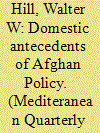

|
|
|
|
|
| Publication |
2012.
|
| Summary/Abstract |
Realism tells us that states are unitary actors and foreign policy ends at the water's edge. This essay questions this view in the context of recent US policy on Afghanistan. In early 2008, Senator Barack Obama won several early primary victories and gained a substantial lead in the Democratic presidential nomination contest. Both Democratic senator Hillary Clinton and to a lesser extent the apparent Republican nominee, Senator John McCain, questioned Obama's leadership ability. The future president responded in part by announcing his intent to expand the US military presence in Afghanistan. The policy of increased militarization crystallized publically in response to domestic campaign pressure rather than because of events on the ground in South Asia.
|
|
|
|
|
|
|
|
|
|
|
|
|
|
|
|
| 3 |
ID:
113290
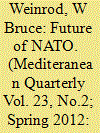

|
|
|
|
|
| Publication |
2012.
|
| Summary/Abstract |
Although fundamental questions concerning whether the North Atlantic Treaty Organization (NATO) is still relevant or necessary have emerged, NATO remains necessary for the protection of Western security and political interests. The international security environment remains unstable, and threats can arise far from NATO territory. In addition to its traditional role of defending members' territory, NATO is assuming new security-related missions. In addition, the alliance has developed "partnerships" with numerous nations throughout the world. These networks can enhance NATO's military capabilities and also encourage democracy. Thus, NATO has the potential to play a significant and constructive global security and political role in the twenty-first century.
|
|
|
|
|
|
|
|
|
|
|
|
|
|
|
|
| 4 |
ID:
113293
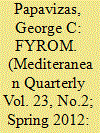

|
|
|
|
|
| Publication |
2012.
|
| Summary/Abstract |
In the post-Cold War reality, stability in the Balkans must be of great importance. It is therefore imperative to examine the nature of the region's instabilities as well as their sources and their implications. The Former Yugoslav Republic of Macedonia (FYROM) has been praised by the West as a good example of stability. However, because of several systemic weaknesses-past habits acquired during fifty years of communism-FYROM has become and will always be a destabilizing force, especially if it continues to pursue the expropriation of the Hellenic Macedonian name and ethnicity, the intensification of its illiberal history revisionism, the expropriation of the Bulgarian language and parts of Bulgarian history, and the mistreatment of minorities.
|
|
|
|
|
|
|
|
|
|
|
|
|
|
|
|
| 5 |
ID:
113296


|
|
|
|
|
| Publication |
2012.
|
| Summary/Abstract |
The North Atlantic Treaty Organization has some strange partners, in terms of history. The oddest couple of all may be Greece and Turkey. The two neighbors fought four wars in the space of a quarter century (1897 to 1922) and are still mutually suspicious. But they have followed parallel courses within the alliance-joining some group actions while remaining aloof to others. Meanwhile, the alliance has over the past two decades changed its posture from defense to offense and from a focus on the European continent to perceived enemies in North Africa, Asia, and the Middle East. Now it is a heavily armed organization in almost desperate search of an antagonist. That is not what Greece or Turkey signed up for when they joined NATO in 1952.
|
|
|
|
|
|
|
|
|
|
|
|
|
|
|
|
| 6 |
ID:
113295
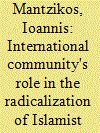

|
|
|
|
|
| Publication |
2012.
|
| Summary/Abstract |
In December 1992, the United Nations Security Council, acting under chapter 7 of its charter, authorized the use of all necessary means to secure the delivery of humanitarian aid to the people of Somalia. In the collapsing landscape of that country, however, the intervention of the international community triggered the rise of radical Islamic actors. This result was not simply a product of diplomatic incompetence but an indirect result of the foreign community's different perspectives and aims during the crisis. This essay attempts to draw conclusions from the political economy of the crisis to address the rise of the local Islamist movement with the use of security dilemma theory.
|
|
|
|
|
|
|
|
|
|
|
|
|
|
|
|
| 7 |
ID:
113291


|
|
|
|
|
| Publication |
2012.
|
| Summary/Abstract |
In this essay policies against non-Muslim minorities implemented during World War II by the Turkish government are analyzed: specifically, the mobilization of minority young men aged eighteen to forty-five years into work battalions from May 1941 to September 1942, as a repetition of the Amele Taburlari during World War I, and the capital tax implemented as a means of economic destruction of the non-Muslim minorities from November 1942 to March 1944. The motivations, conditions, and implementation of both antiminority measures are analyzed and their consequences are presented.
|
|
|
|
|
|
|
|
|
|
|
|
|
|
|
|